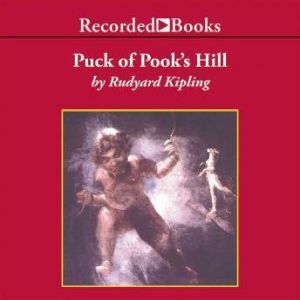

Puck of Pook's Hill
Author: Rudyard Kipling
Narrator: Steven Crossley
Unabridged: 7 hr 27 min
Format: Digital Audiobook Download
Publisher: Recorded Books
Published: 08/02/2013
Categories: Children's Fiction


Author: Rudyard Kipling
Narrator: Steven Crossley
Unabridged: 7 hr 27 min
Format: Digital Audiobook Download
Publisher: Recorded Books
Published: 08/02/2013
Categories: Children's Fiction
Short-story writer, novelist, and poet Rudyard Kipling was the first Englishman to receive the Nobel Prize for Literature and was hailed as a literary heir to Charles Dickens. His most popular works include The Jungle Books, Kim, and "The Man Who Would Be King." Audiences love his romantic tales about the adventures of Englishmen in strange and distant parts of the world. Characteristic of Kipling is sympathy for the children's world, a satirical attitude toward pompous patriotism, and belief in the blessings and superiority of the British rule. Although he was widely regarded as Britain's unofficial poet laureate, Kipling refused the honor, as well as the Order of Merit.
Kipling was born in 1865 in British-ruled Bombay, India, where his father was an arts and crafts teacher. At age six, he was put in a London foster home, and it was here that he began writing, influenced by his pre-Raphaelite ancestors. When Kipling was thirteen, he entered United Services College, an expensive military boarding school. His poor eyesight and mediocre grades ended his hopes for a military career. These years are recalled in a lighter tone in his book Stalky & Co.
Kipling returned to India in 1882, where he worked as a journalist, an assistant editor, and an overseas correspondent. Seven years later, Kipling moved back to London and married Caroline Starr Balestier, the sister of an American publisher and writer. They moved to the United States but, dissatisfied with life in Vermont and distraught by the death of his daughter, Kipling moved his family back to England. Still restless, he poured his energy into writing and produced The Jungle Books.
During the Boer War, Kipling spent several months in South Africa. In 1901, he published Kim, which is widely considered his best novel. Kipling received the Nobel for Prize for Literature in 1907. The prestigious prize was awarded for his power of observation, originality of imagination, virility of ideas, and remarkable talent for narration. Kipling died on January 18, 1936, in London.
The more familiar I become with Kipling's many short, fantastical works, the clearer it becomes that almost every fantasy author of the past century owes him a great debt. I have pointed out before that he has written works which lay out whole subgenres--blueprints which later authors like C.S. Lewi......more
I read this because it was available free on Kindle (now I am on a "Kindle"-ing spree). This book carries with it a childhood memory for me. I used to buy comics from the Higginbothams' bookstall in the railway station (they still have stalls all over railway stations in South India, but carry mostly......more
Weland gave the Sword, the Sword gave the Treasure, and the Treasure gave the Law. It's as natural as an oak growing. I continue reading children's literature that I missed when I was a child. Actually, I read very few fairy tales, so this has a foreign flavor on my tongue. I enjoyed the poetry s......more
If you like Harry Potter, this book is for you! The British have a wonderful tradition of excellent adult authors writing fantasy children’s books that are also fun reads for adults. J.K. Rowling’s “Harry Potter”, C.S. Lewis’ "Alice in Wonderland" and "Chronicles of Narnia", and J. M. Barrie’s "Peter......more
For such a short book, there's an awful lot to say about it and I don't think I can do it justice. This is the first time I've read Kipling in original. I read the Jungle Books as a child, in Polish translation of course, and I loved them, but childhood reading experience is never enough to really kn......more